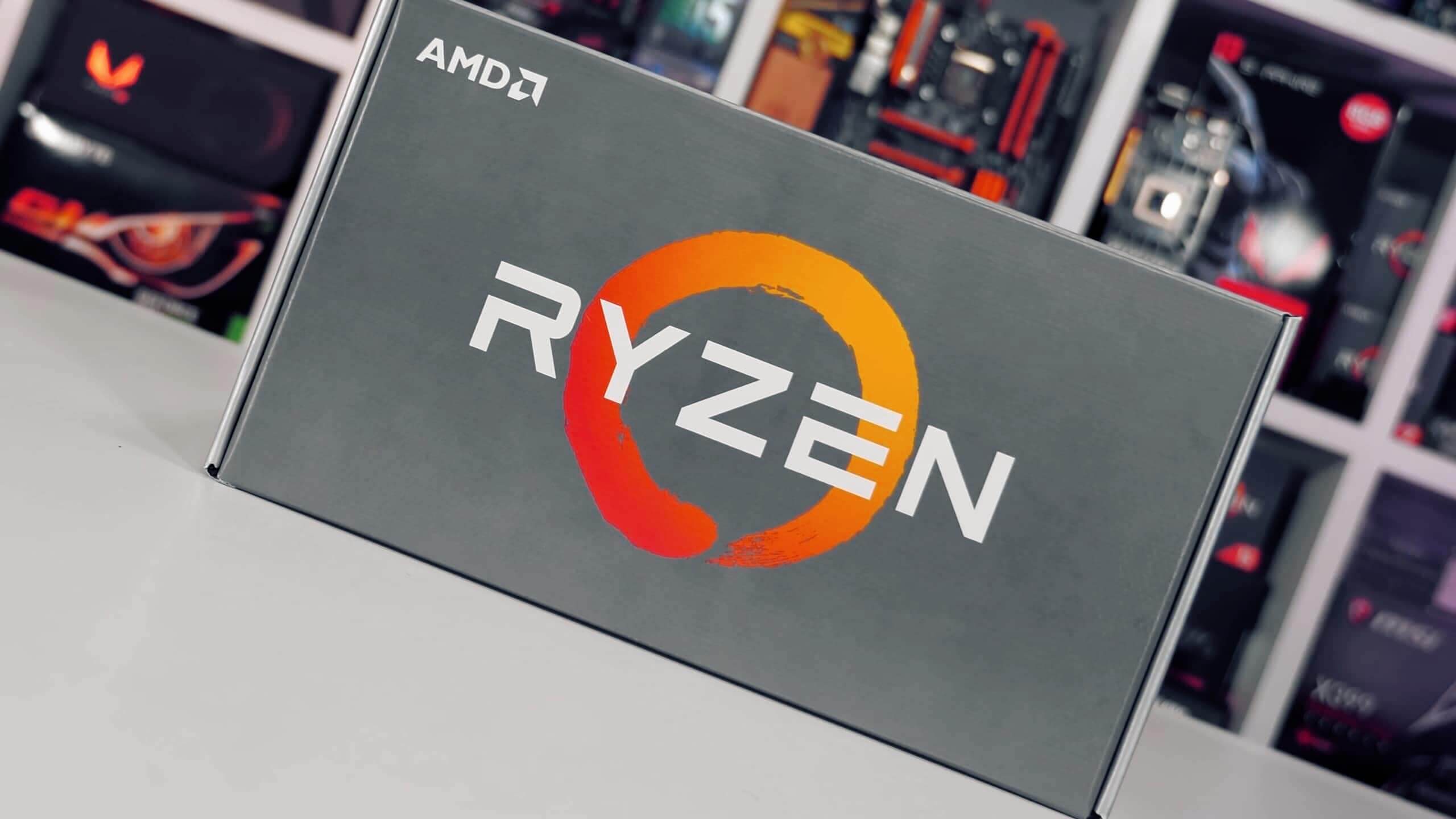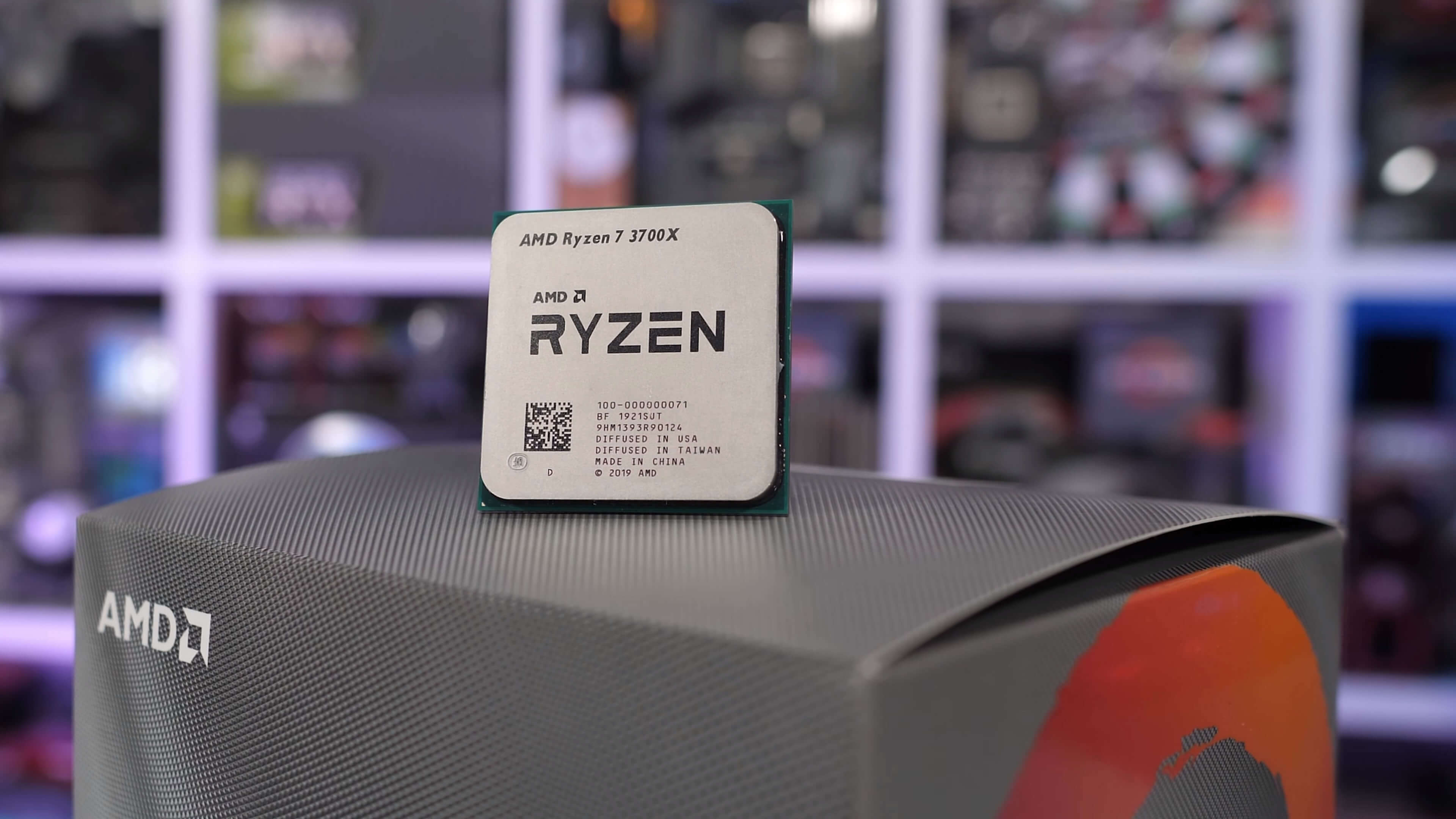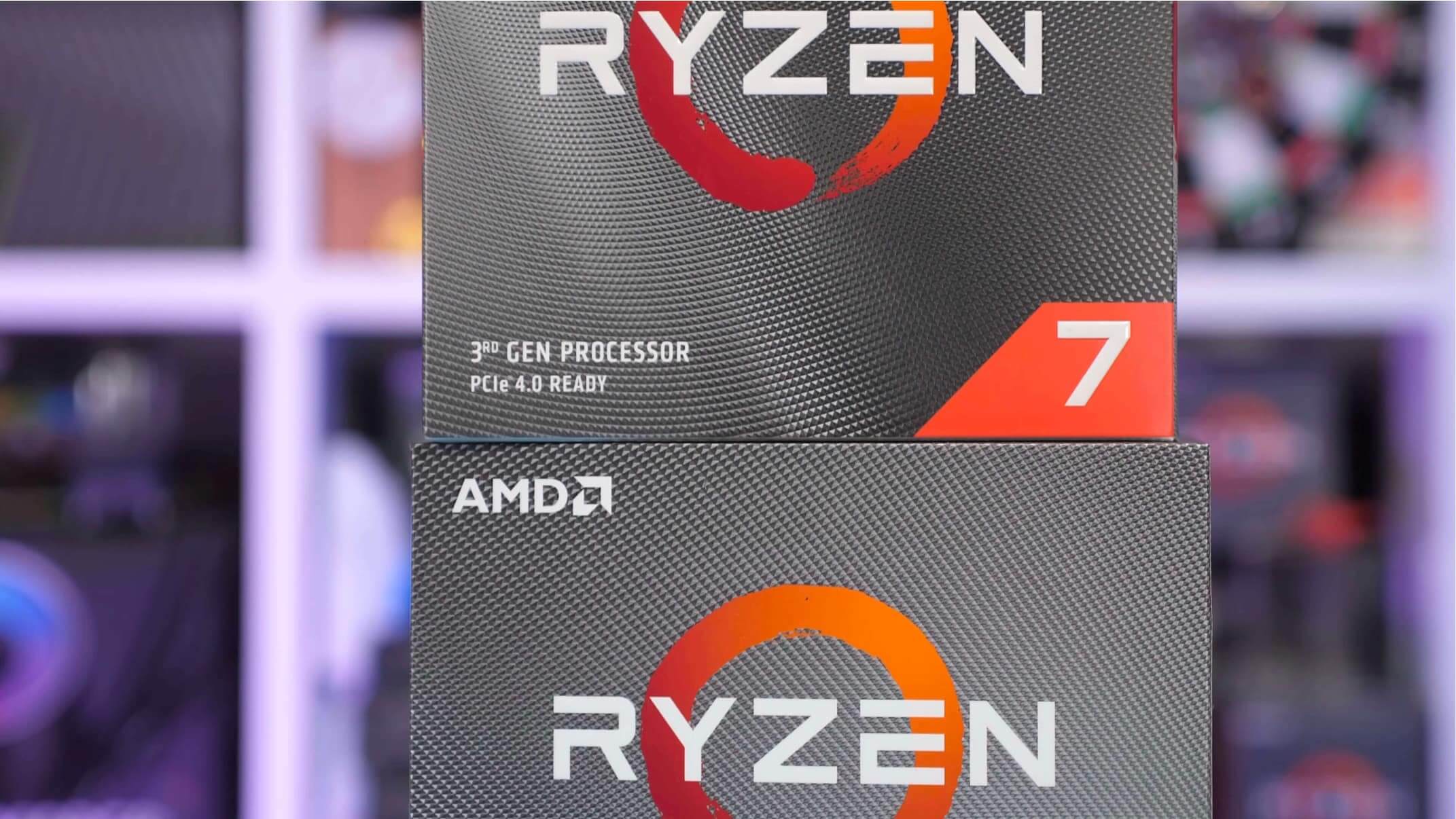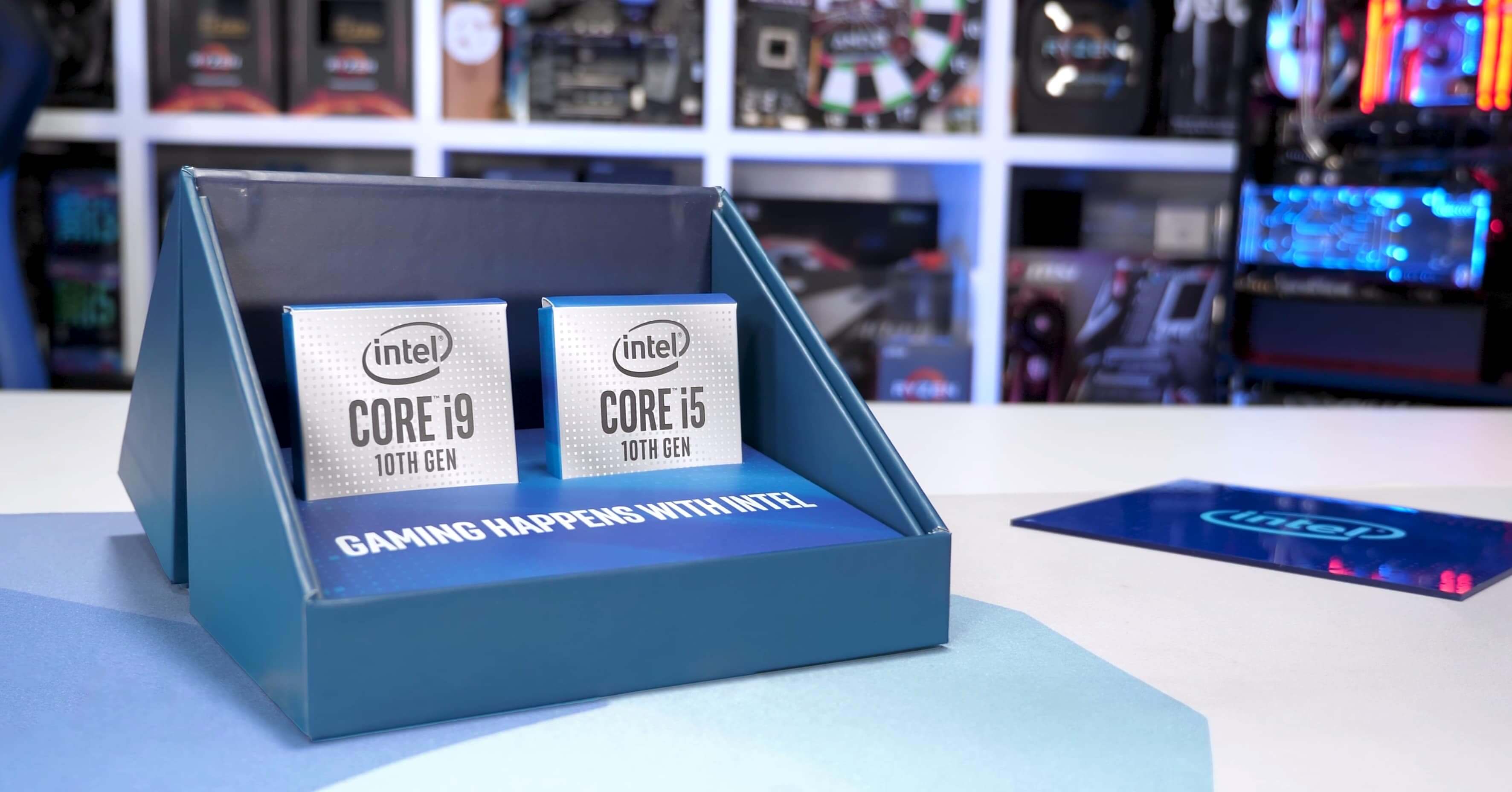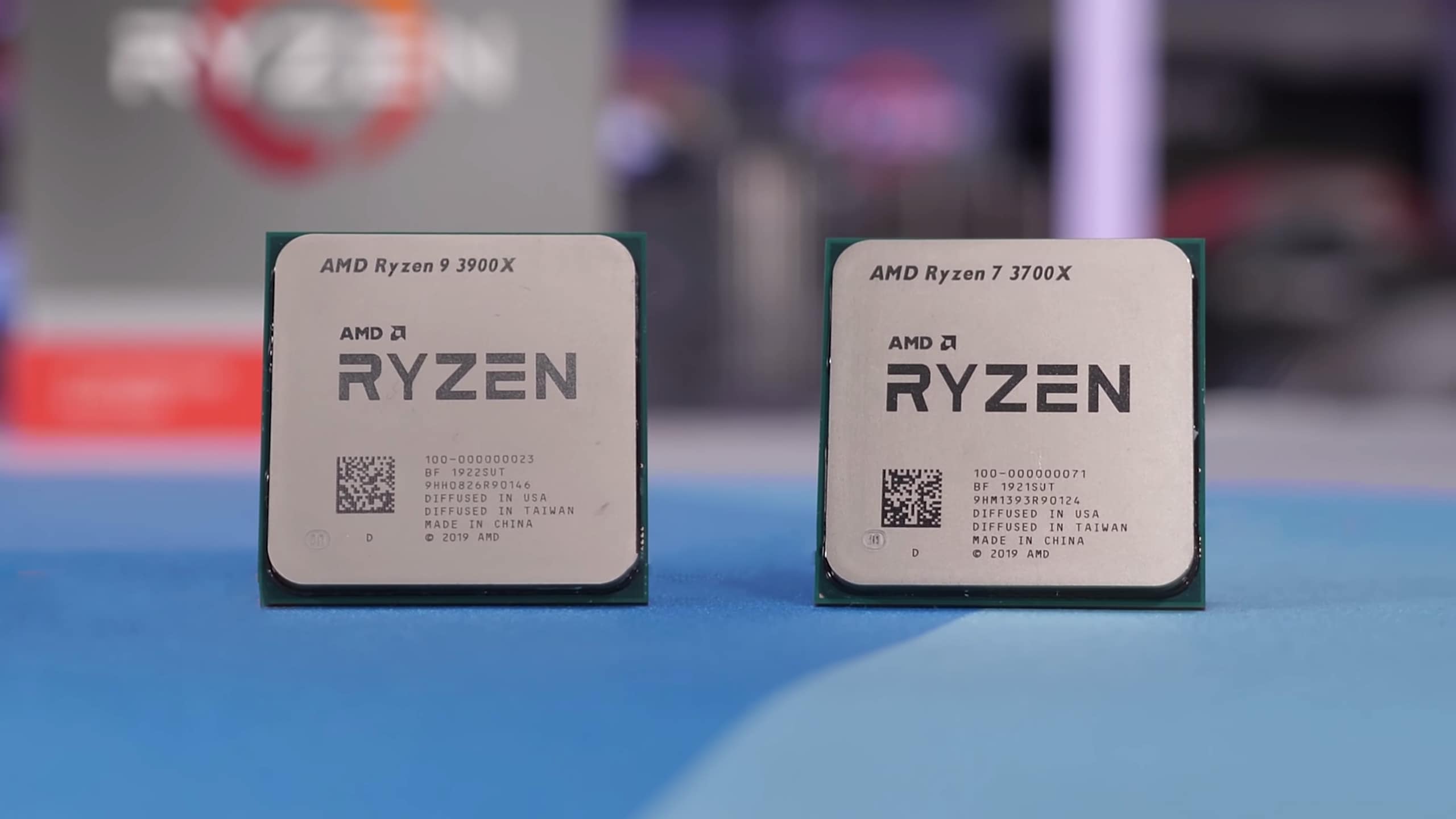Recently we compared the Ryzen 7 3700X against the new Core i5-10600K in 9 competitive titles using low quality settings to see just how much faster the Intel processor is when letting the frame rate shoot well above what you'd need for 144Hz gaming.
The results were interesting, though for the most part the margins weren't overly different to what we had seen in our original CPU review. That is, performance in esports style of games didn't differ greatly than when we tested modern AAA games using high and ultra graphics quality presets.
We had found the i5-10600K to be 6% faster on average than the R7 3700X when gaming, and that margin barely changed to 7% using low quality settings in games such as Rocket League, Fortnite and PUBG. Clearly, the 3rd-gen Ryzen processor was able to hold its own and even pulled ahead in a few instances.
This had us wondering how well the previous generation R7 2700X would stack up against the 3700X, and of course, the i5-10600K, under the same test conditions. So we've gone back, tested and added the 2700X to the results in this benchmark comparison. We also took the time to overhaul our CSGO testing using a method recommended by a number of very keen Counter-Strike gamers.
For testing we're looking at out of the box performance with XMP loaded using CL14 DDR4-3200 memory on both AMD and Intel processors. The 10600K is not power limited, as that's typically the out of the box experience. Also, in our original review we found that a 5.1 GHz overclock could boost gaming performance by as much as 12%, so keep that in mind. We've also found gains of over 20% for Ryzen processors when adjusting memory timings. That's to say in our experience we've found AMD and Intel processors enjoy similar performance gains when tuning.
Benchmarks
We'll be looking at the same suite of 9 games, all tested at 1080p and 1440p using low quality settings with both an RTX 2080 Ti and an RTX 2060 Super.
First up we have Battlefield at 1080p using the low quality preset and already we face some interesting results. The 2700X isn't much faster with the 2080 Ti when using the low quality settings opposed to the ultra quality settings, we're looking at about a 13% improvement in average frame rate with no change to the 1% low.
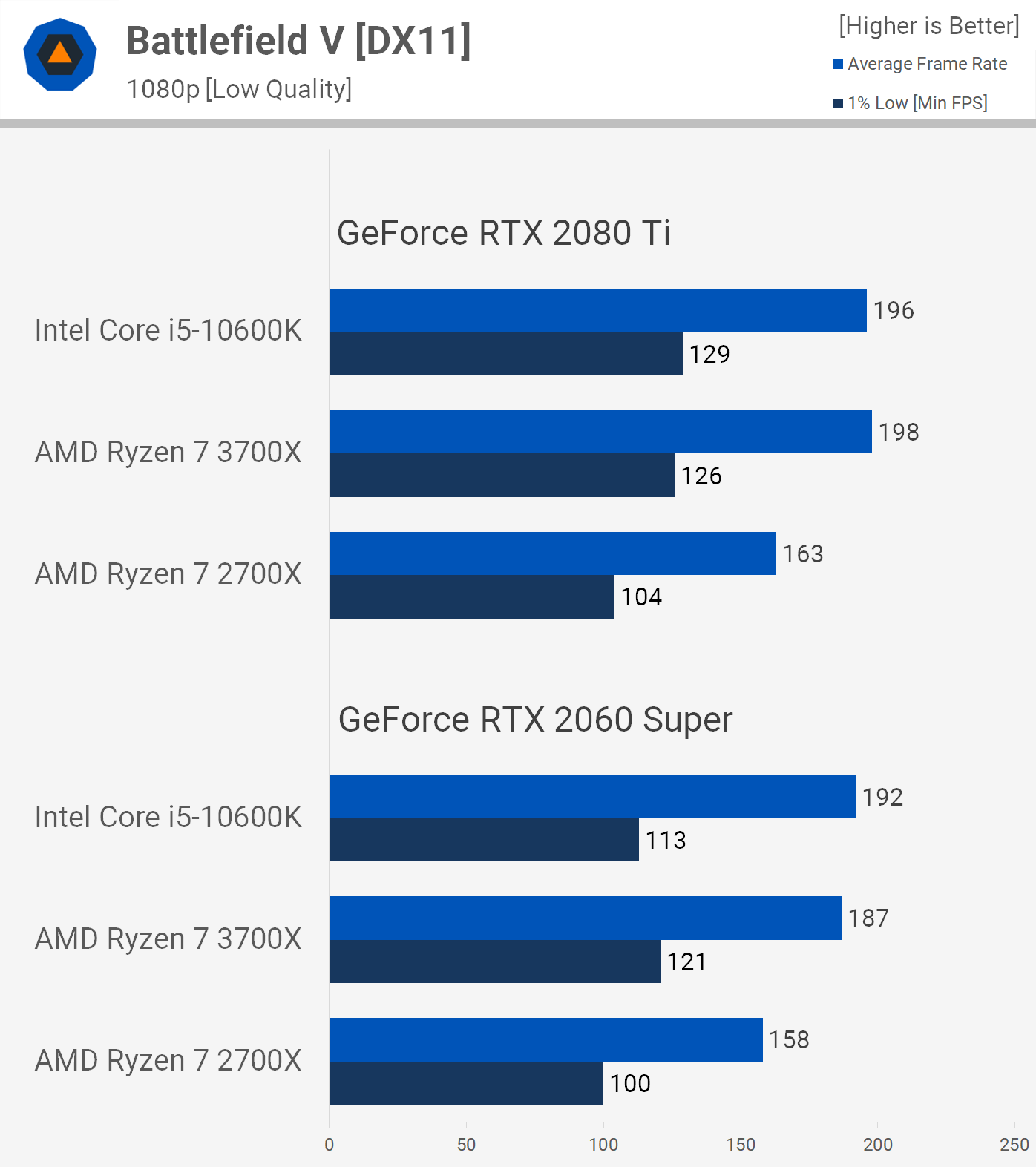
Also for reference, with the ultra quality settings the 3700X is 9% faster than the 2700X, but we're seeing a 21% increase in performance for the 3rd-gen Ryzen processor. This highlights the kind of step forward AMD made with the Zen 2 architecture.
Perhaps more surprising is that even with the RTX 2060 Super, the 2700X is still the performance limiting component as here the 3700X was 18% faster. Of course, the 2700X was still good for over 100 fps at all times, so we imagine most of you will be satisfied with the level of performance using higher quality settings, but it's clear for competitive gaming the 2700X is the primary bottleneck.

The 1440p results are a little more favorable as we start to see the test conditions become a little more GPU bound. The 3700X was 9% faster than the 2700X when looking at the average frame rate with the RTX 2080 Ti, but 16% faster when comparing 1% low data. Even with the 2060 Super we see up to a 12% performance increase when going from the 2700X to the 3700X.

In Fortnite we're looking at virtually identical performance using either the 2060 Super or 2080 Ti, as the three CPUs are the primary performance limiting component, so let's just focus on the 2080 Ti data. Here we're again looking at up to a 23% performance improvement for the 3700X over the 2700X, taking the average frame rate from 265 fps up to 325 fps. The 10600K is still 8% faster than the 3700X which is an impressive result for Intel.
At the same time, it's evident how much AMD has managed to bridge the gap in a single generation. We should note that the 2700X was able to maintain over 200 fps at all times in our demanding Fortnite benchmark, so while much slower than the Intel Core i5, for most gamers it's still getting the job done just fine. Yet clearly if you're serious about Fortnite and want the maximum performance possible, it wouldn't have made sense to purchase a 2nd-gen Ryzen processor in favor of the Intel alternatives.

Jumping to 1440p with the 2080 Ti we're still looking at a substantial performance uplift for the 3700X over the 2700X. Here 3rd-gen Ryzen was up to 21% faster.
It's also worth noting that the 10600K is up to 33% faster. Basically if AMD were competing with Intel's 10th-gen range using 2nd-gen Ryzen it would be a bloodbath for team red. Of course, in the process AMD drove down Intel pricing, but still the margin between the 2700X and 10600K is truly massive.
When using a less powerful GPU like the RTX 2060 Super we've already run into a fairly strong GPU bottleneck at 1440p and now the 10600K is just 8% faster than the 2700X.
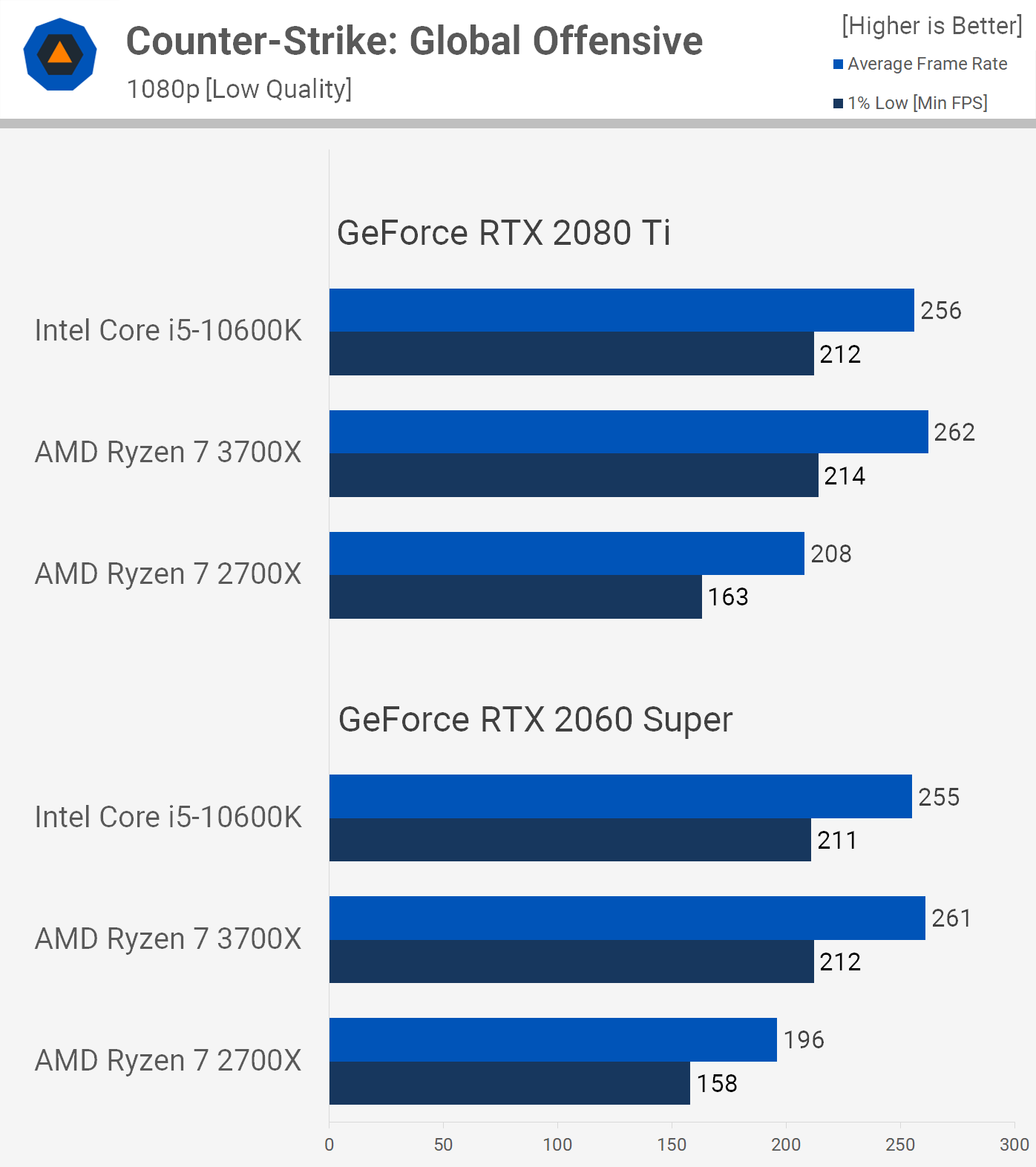
For testing CSGO, we previously moved away from the community benchmark to bot matches which more accurately represented real gameplay, but getting accurate data with bots can be tricky. The good news is, it turns out there's an even better method for accurately measuring real gameplay and that method sees us take advantage of the replay function by viewing pro matches.
So we've gone back and tested the three CPUs using this new method. Previously we had found the 3700X to be 8% faster than the 10600K when comparing the average frame rate and up to 22% faster when comparing the 1% low data. The frame rates however were much higher as the bot match didn't see smoke grenades regularly going off.
Using the pro match we see that the 3700X and 10600K are much more evenly matched. Compared to the 2700X however, the 3700X was up to 31% faster taking the 1% low figure from 163 fps right up to 214 fps. That's a massive generational performance leap.

The margins remain about the same at 1440p. Here the 3700X was up to 34% faster than the 2700X which saw it deliver comparable performance to the 10th-gen Core i5 processor.

Next up we have the Rainbow Six Siege results where we find our biggest margins yet. Whereas the 2700X limited the RTX 2080 Ti to 304 fps on average, the 3700X was almost 40% faster, hitting 420 fps. That performance uplift almost seems too significant but remember, core to core communication was improved by up to 50%, as seen in our day-one review. Those margins are less extreme when using the RTX 2060 Super, but even so the 3700X was up to 22% faster.
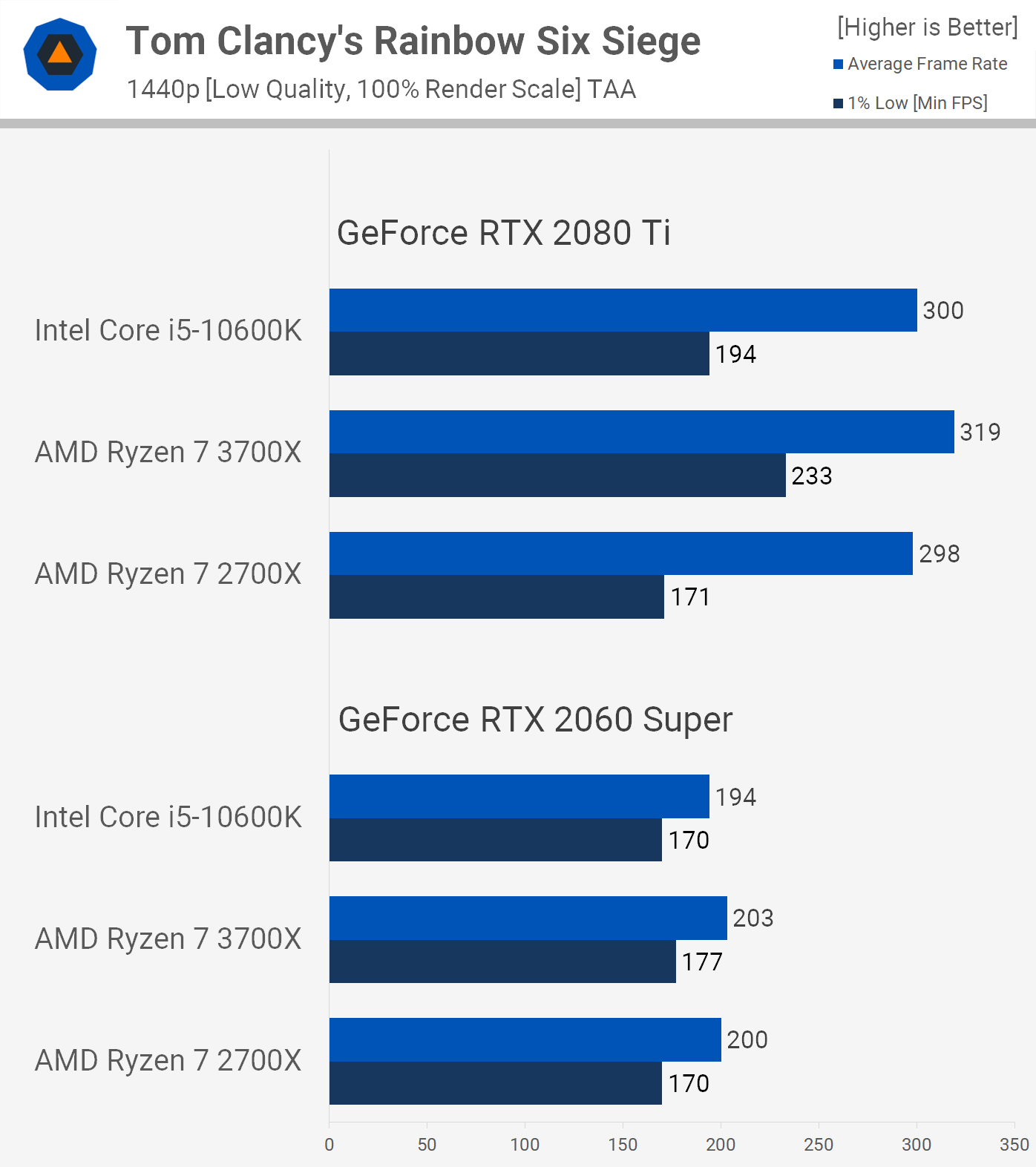
The RTX 2060 Super results at 1440p see all CPUs deliver virtually the same performance, showing we're heavily GPU limited. Big margins are still seen when using the RTX 2080 Ti and although the 2700X matched the average frame rate of the 10600K, the Intel processor was 13% faster when comparing 1% low performance.

PlayerUnknown's Battlegrounds results show a more mild 13% performance uplift for the 3700X over the 2700X, and while that's still a nice generation-on-generation uplift, it's one of the smaller gains we've seen so far.
It's worth noting that the Core i5-10600K was 17% faster than the 3700X, so Intel does enjoy a substantial performance advantage in this title. The 10600K was also up to 32% faster than the 2nd-gen Ryzen processor.
Because the 3700X is able to bridge the gap between the 2700X and 10600K, we find when using a less powerful GPU like the RTX 2060 Super that the 3rd-gen Ryzen processor is able to push the mid-range GeForce GPU to its limits. In fact, the 3700X was up to 21% faster than the 2700X with the slower GPU.
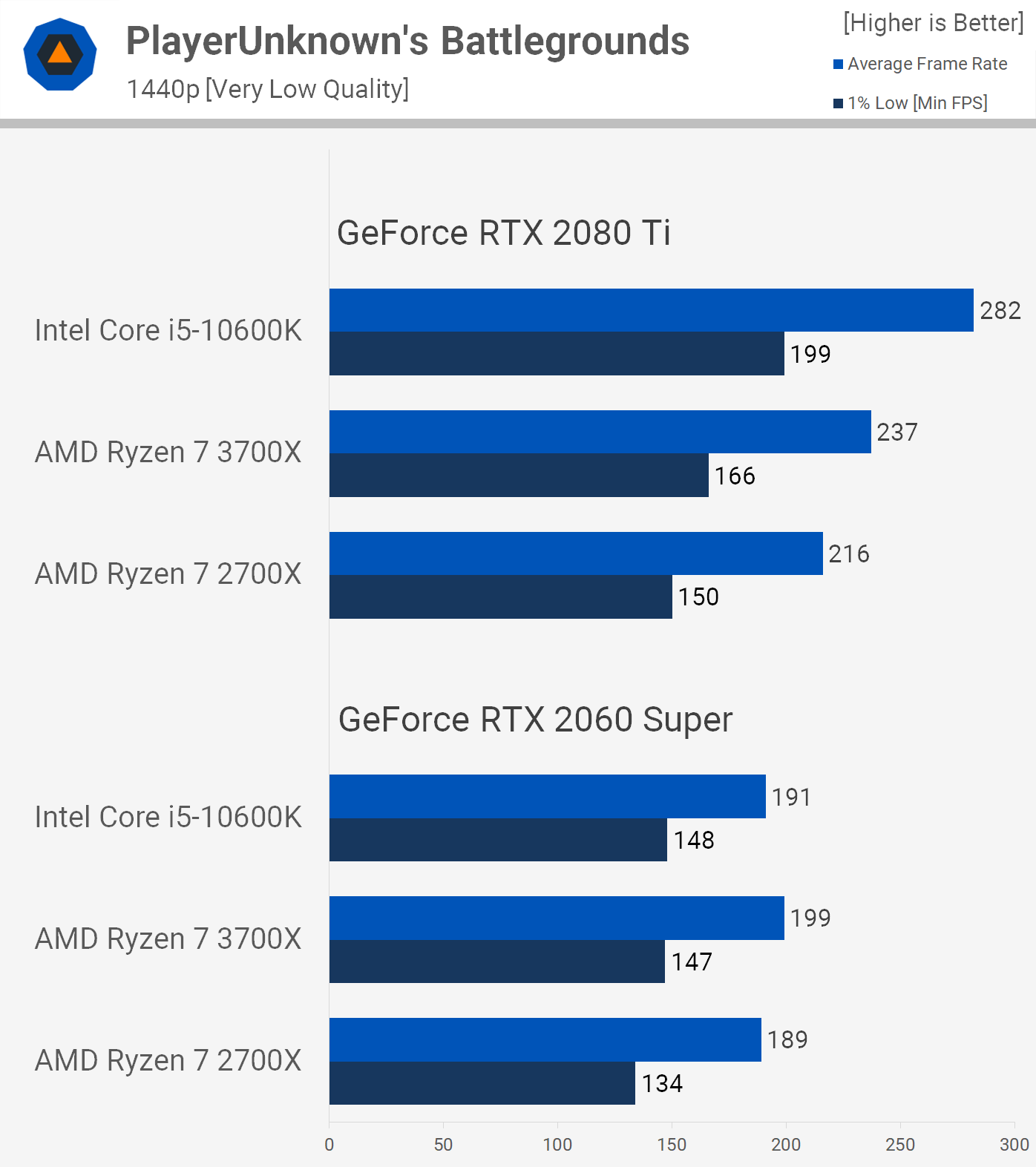
Increasing the resolution to 1440p reduces the 3700X's lead over the 2700X to just 10% with the RTX 2080 Ti. The 10600K was still up to 19% faster.
Again, for max performance in a title such as PUBG, the Intel processor is clearly the superior option, though most may not require north of 150 fps in this title.

Moving on to Call of Duty: Modern Warfare, we're only looking at very mild performance gains when moving from the 2700X to the 3700X to the tune of 8% better average frame rates, while the 10600K was 5% faster than the 3700X.
With the RTX 2060 Super we saw basically the same performance from the three processors.
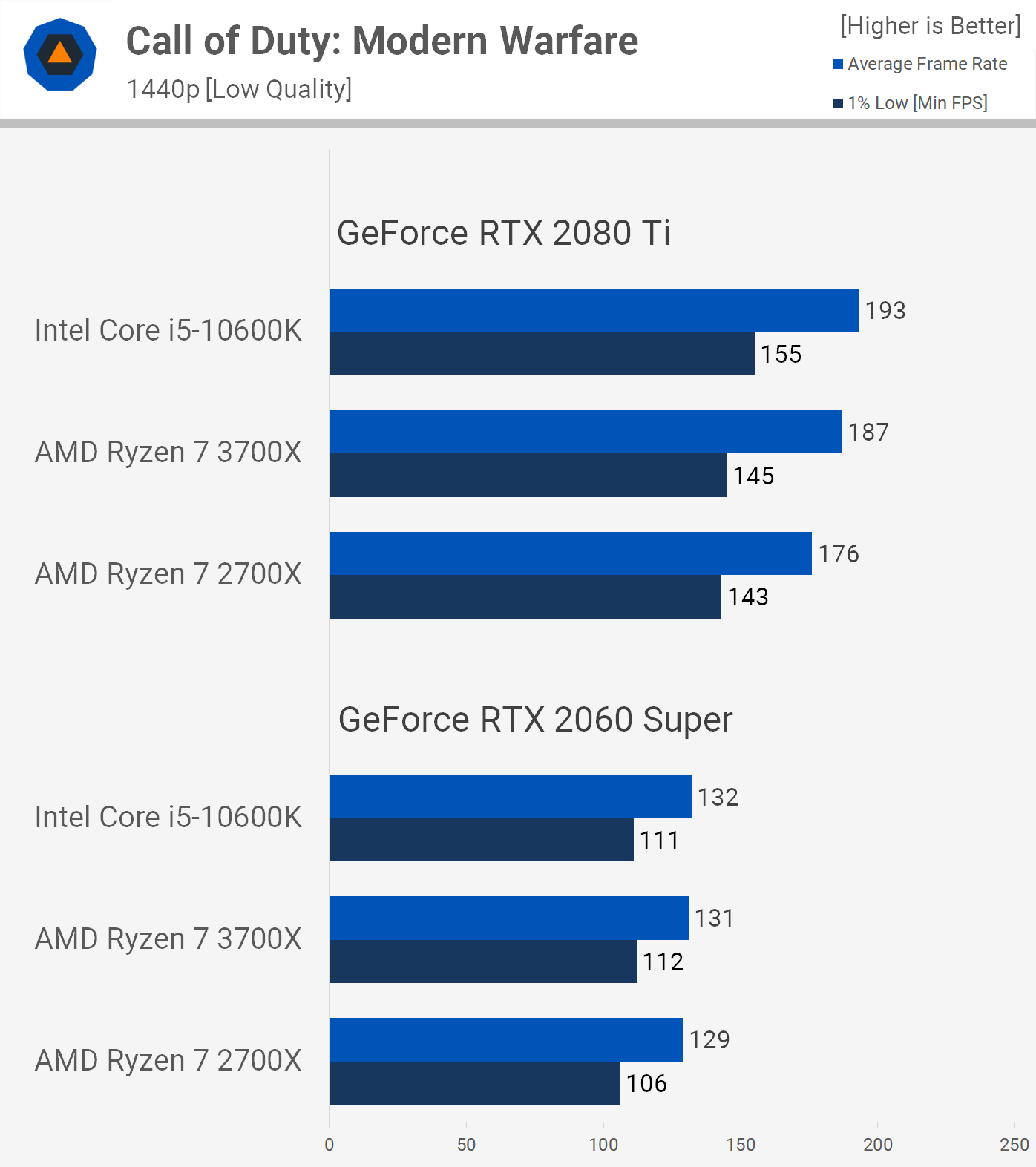
The 1440p data sees virtually the same margins, we're looking at up to a 6% improvement for the 3700X over the 2700X with the RTX 2080 Ti and RTX 2060 Super.
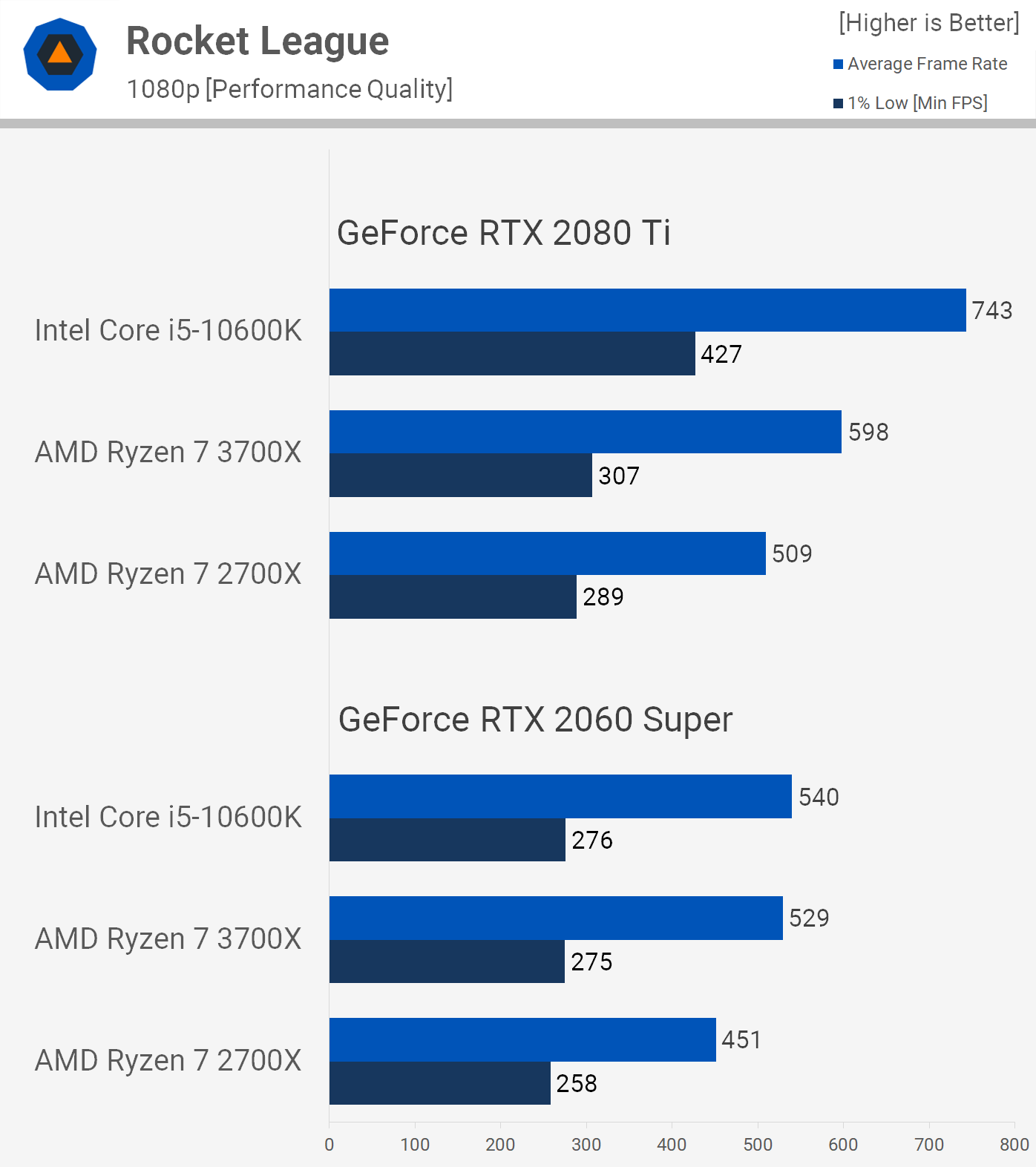
When testing with Rocket League both Ryzen processors provided similar 1% low performance despite the 3700X boosting the average frame rate by 17%.
We should note that by default Rocket League caps the frame rate to 250 fps, though it can be removed by editing a configuration file. Even the 2700X will max out an RTX 2080 Ti prior to any modifications of the game files.
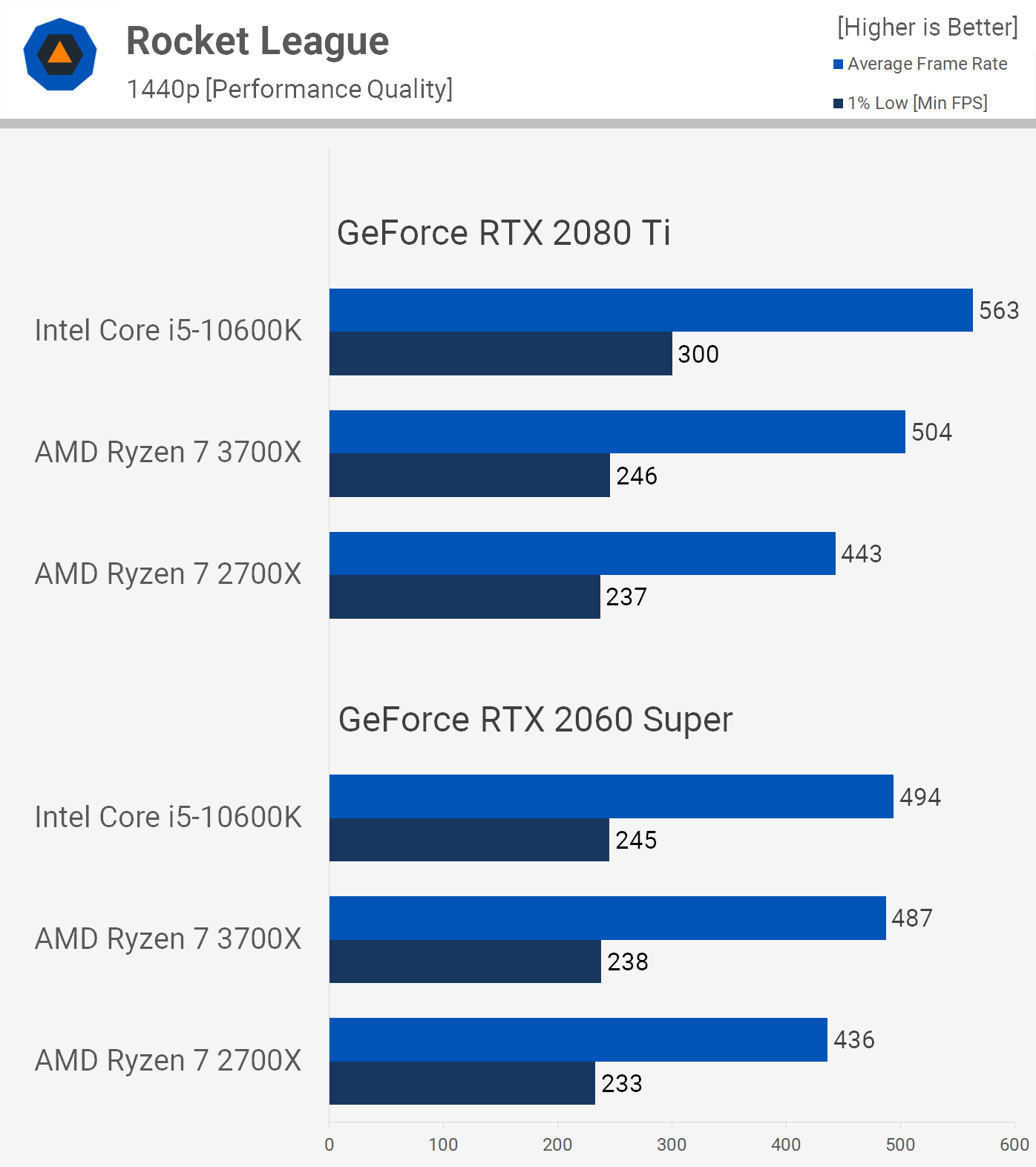
The margins close up a little at 1440p as the game starts to become more GPU bound, but still the 2700X and 3700X delivered comparable 1% low performance with averages well over 400 fps.

World of Tanks is a slow-paced tank shooter where positioning is more important than flick shots, so 144 Hz displays that are fed 144 fps will be more than sufficient for this one. That being the case the 2700X is perfectly fine for World of Tanks gaming as it allowed for over 170 fps at all times.
But of course, looking at this purely from a performance standpoint the 3700X was up to 22% faster which is a significant uplift. Without 3rd-gen Ryzen, Intel would be up to 37% faster in this title.
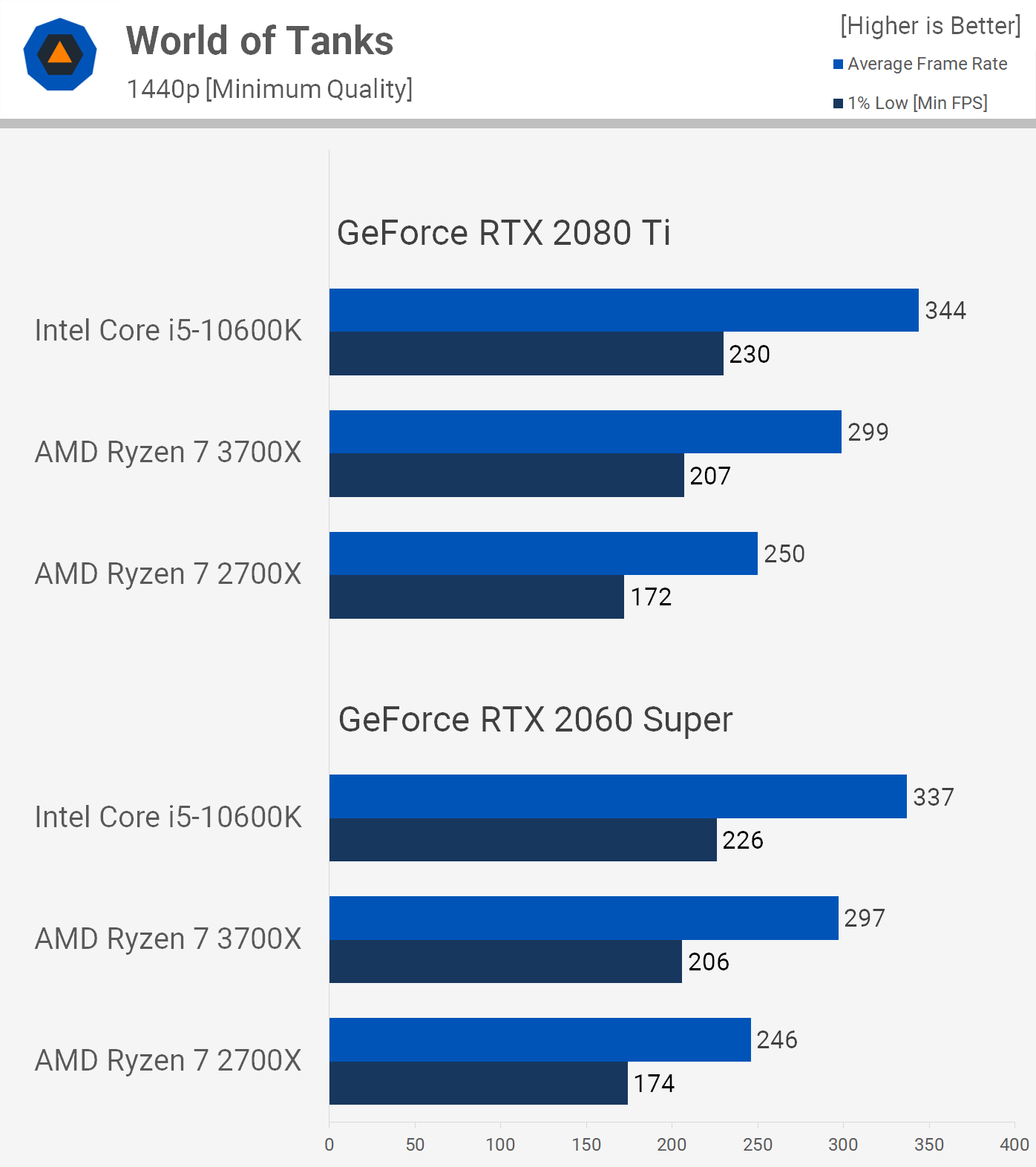
The margins seen at 1440p are much the same. We're still primarily CPU limited but 2700X still allowed for over 170 fps at all times.
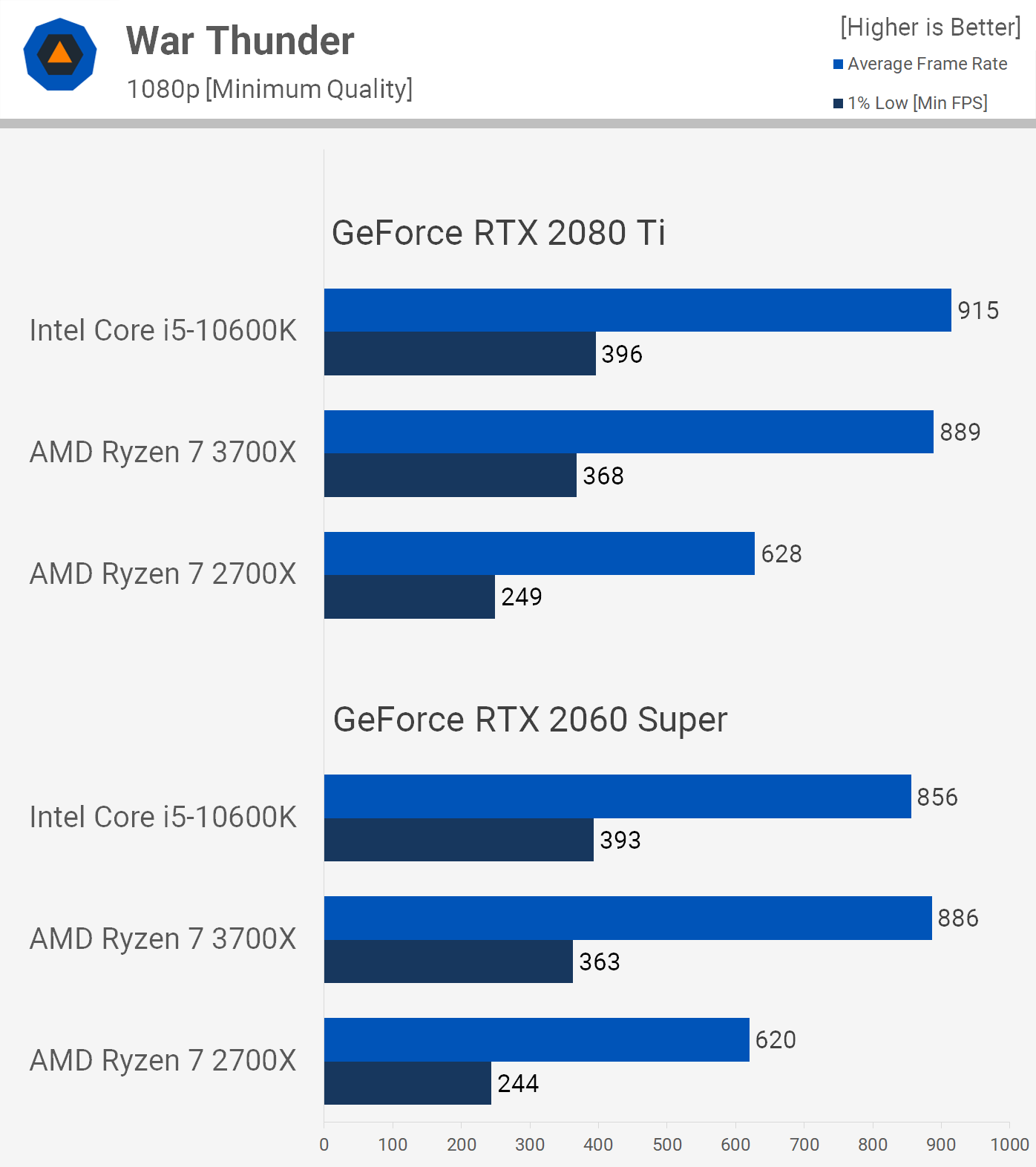
The War Thunder gives us another example of the significant step forward AMD made with Zen 2. Here the 3700X is up to 48% faster than the 2700X when looking at 1% lows and 42% for the average frame rate.
The 2700X heavily limits system performance in War Thunder and while a minimum of ~250 fps is still impressive, it's a far cry from what the Intel processor can achieve in comparison.

Even at 1440p the 3700X is still up to 43% faster than the 2700X while the 10600K is just 14% faster than the 3700X which admittedly is still a decent margin, but it does seem a lot less significant given we're talking about 348 fps vs 397 fps.
Taking an Average
In the graph below you can check out the average performance seen across the 9 games we just tested. Comparing the 1% low data, we see that the Ryzen 7 3700X was on average 20% faster than the 2700X and 26% faster when comparing average fps. Those are some truly impressive generational performance gains.
The 2700X still enabled highly playable performance with smooth frame rates, so for many gamers that difference won't be realized, particularly given you're almost always GPU limited under realistic conditions, high refresh/competitive gaming being about the only exception.
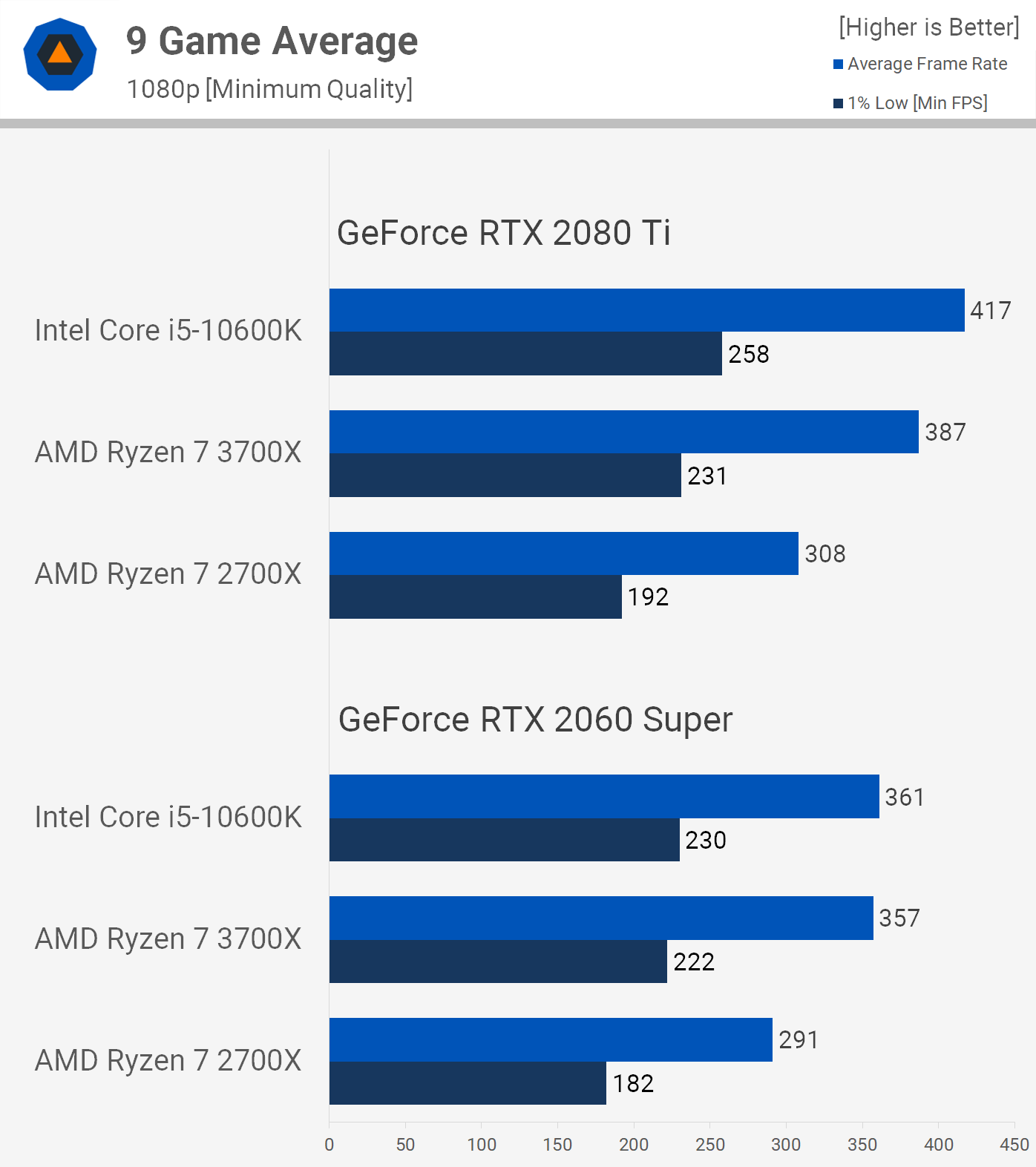
The 3700X was still around 22% faster when using the slower RTX 2060 Super, though that's not surprising given the quality settings used at 1080p. This also highlights that anything faster than the RTX 2060 Super is mostly pointless for competitive gaming.
What We Learned
For some of you these results will come as a surprise, especially because this isn't the kind of game testing we usually perform. We also don't believe many other tech media outlets have provided this sort of data, which makes sense given most of you probably aren't seeking extreme 300+ fps frame rates in Rocket League, War Thunder, or Fortnite.
That said, we have included low resolution testing in the past that revealed the 8700K to be up to 52% faster than the 2700X, albeit in an older version of CSGO using an inferior test method and that particular result was an outlier. While the 10600K was on average 35% faster than the 2700X in this test at 1080p using low quality settings, we have found similar margins when testing with titles such as Far Cry Primal, Total War Saga: Thrones of Britannia, StarCraft II, Wreckfest, and World of Tanks, to name a few.
We've also found very significant improvements in cache bandwidth, core-to-core communication and DRAM latency in past IPC tests comparing the 2700X and 3700X.
Something else worth noting is a 2-year-old feature we wrote, comparing the Ryzen 7 2700X and Core i7 8700K on a 35 game benchmark. When forming our conclusion we broke down the pros and cons, and in the end said we'd personally get the 8700K, it was simply the better gaming CPU. We noted that even though the 2700X packed 2 extra cores, which made it the superior performer in core-heavy workloads, we didn't expect that to give it an advantage in games within the next few years.
Fast forward to today and the 8700K, which has essentially been re-branded as the 10600K, is still faster than the 2700X in all games. The performance difference in more demanding AAA titles under realistic test conditions is closer to 12% rather than the 35% seen here in competitive gaming benchmarks. Still, for roughly the same price we'd buy the 8700K over the 2700X for gaming.
There is no question AMD has taken a significant leap with Zen 2. In our opinion, gaming performance is so close now relative to Intel that it won't make a difference for the vast majority of gamers. It'll be interesting to see what kind of step forward AMD can make with Zen 3 and we suspect it won't be long before Intel's feeling serious pressure on all fronts. Hopefully they can also provide some decent IPC gains with future generations.
